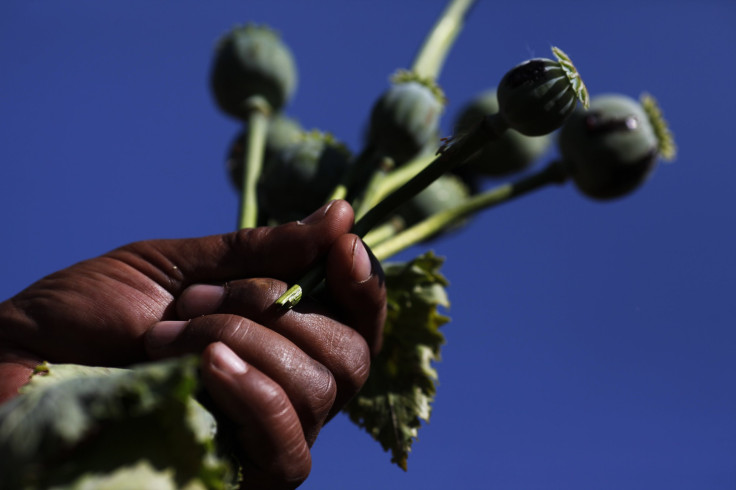Myanmar's Economy May Be Blossoming, But So Is Its Lucrative Drug Production And Export Business
Myanmar’s tiny but burgeoning economy does have other countries beat in one respect: the production and export of drugs. In 2010, the U.S. Congressional Research Service estimated the country’s drug export trade to be worth between $1 billion and $2 billion per year. At the time, Myanmar’s GDP was just over $50 billion, by the International Money Fund’s estimation.
On Wednesday, as a part of World Drug Day, Myanmar's authorities burned $76 million worth of drugs including more than 800,000 pills and half a ton of opium and heroin, Channel News Asia reported.

While Myanmar’s economy is growing faster since the new government assumed power in 2011 and foreign investments began to pour in, its drug problem is not showing any signs of improvement. If anything, a combination of economic pressures and opportunity is fostering an increase in both traditional poppy cultivation for opium and the production of heroin and methamphetamine pills, according to Irrawaddy, a Burmese newspaper based in Thailand.
Most of Myanmar’s drug trade originates in the vast, jungle-clad mountain region of northeastern Shan state, a remote, impoverished area where the government has little control. Growing poppies is the only real industry there, according to the Associated Press.
More than 200,000 farming families are estimated to be growing opium poppies across 100,000 acres. Myanmar is the source of nearly one-quarter of the poppy plants used to make opium and heroin, making it the world’s second-largest illegal opiate supplier after Afghanistan, the United Nations Office for Drugs and Crime (UNODC) said.
Last October, Myanmar quietly revised a deadline the ex-junta set in 1999 to eradicate illicit drugs by 2014. It changed the date to 2019 and set a more realistic target, AP reports.
"Our objective is to reduce opium poppy cultivation as much as we can," said Myint Thein, head of the Central Committee for Drug Abuse and Control, which controls the country's drug policy. "There is no country where you have zero drugs."
Myanmar remains on the United States' blacklist of countries that are failing to deal with the cultivation of opium poppies, but the U.S. has deferred taking any punitive action because of the country’s progress in reforming its political and economic system.
Thailand, which borders the Shan state, is one of the main target markets for drugs from Myanmar. More than 31 million methamphetamine pills were discovered by Thai anti-drug units between October 2011 and March 2012, a 45 percent year-on-year increase, Irrawaddy reported.
Drugs are more than just an export problem for Myanmar. The UNODC said there is circumstantial evidence that illegal drug-taking is growing rapidly in Myanmar, especially among young people. A 2010 World Drug Report from the agency estimates that there are 66,000 heroin users and 67,000 opium users in Myanmar. The country's population is currently around 60 million.
Despite such a grim outlook, some progress is being made to eradicate the illegal industry. The UNODC was allowed to enter Shan for the first time in January 2012 and is now convincing farmers to convert to other crops, a challenging proposition.
"The farmers don't just want to eat. They need to make money," said Jason Eligh, the UNODC representative in Myanmar who is leading the pilot project to help farmers switch to legal crops, adding that the government needs to offer farmers a path to a better life, with better roads, new schools and health centers, and, most of all, peace and security.
A middle-aged farmer named Awa Wadaa grew opium for 20 years and was pulling in $3,500 a year in the five-month poppy season, when the U.N. offered him a way out, the AP reported. In 2012, he worked year-round rotating crops of corn, potatoes and sunflowers, and earned just $500.
If Myanmar is to flourish and retain its position as the next global investment hot spot, the government will have to find a way to boost its farmers’ living standards without having them resort to what they know how to do best.
"I don't want to grow poppies. I understand it is illegal and that drugs hurt our children," Wadaa said. But the father of five added that without his poppy-farming income, he can't afford to keep his children in school.
"If I can't find a way to make more money," he said, "I will definitely go back to growing poppies."
© Copyright IBTimes 2024. All rights reserved.




















